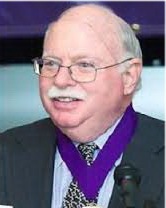Trader Michael Steinhardt. The influence of the criminal world on financial success
If you have become acquainted with the success stories of great investors, then in almost every one you can see a lyrical picture when an unknown boy thinks about his financial well-being and gnaws on the granite of science for the sake of his future.
Hard work and perseverance makes these people successful. Yes, it’s really like everything is in a fairy tale, and you can even believe that you will be in their place if you work hard.
However, behind the soap opera lies much more complex processes that made them what they are. Trader Michael Steinhardt is the greatest trader and investor, and his fortune at this stage exceeds one billion dollars and increases by twenty percent almost every year.
His success is emulated by thousands of traders, but it is his path to becoming a great man that perfectly reflects the dark processes that made him so.
Michael Steinhardt was born on December 7, 1940 in one of the most disadvantaged areas of New York - Brooklyn. When the boy was not yet a year old, his mother abandoned the family and left Michael in the care of his father.
Michael's father was a well-known figure in the criminal world and had connections with such gang leaders as Meyer Lansky and Jim Aiello Three Fingers.
Getting to know the stock exchange. Career
Michael Steinhardt first learned about the stock market and the world of stocks when he was just 13 years old. So, his father, to put it mildly, loved to squander his earned money playing poker. However, he did not always come empty-handed, and once even won shares of the Columbia Gas System and Penn-Dixie Cement from his rival. When Michael celebrated his thirteenth birthday, his father gave him these securities.
Michael did not yet fully understand how much they cost, but when he went to the brokerage house and they were valued at five thousand dollars, Michael immediately realized what he wanted to connect his future with. To be objective, his father, throughout his formation, encouraged his son’s hobbies and regularly gave him huge amounts of money to purchase securities.
After graduating from school with his father’s “dirty money”, Michael moves to Pennsylvania, where he studies at Wharton University. After graduation, Michael Steinhardt served two years in the army, and upon his return began looking for work. So, his first place of work was the Calvin Bullock company, and he held the vacancy of an analyst.

After working at the company for some time, he decided to change jobs and moved to the brokerage house Loeb, Rhodes & Co. Having worked for a long time in this company, two promising managers Fine and Berkowitz met on his life path.
In 1967, with two new colleagues, a foundation called Steinhardt, Fine and Berkowitz was founded. This fund was based on the accumulated funds of its three founders. The first year of the fund's operation brought the company about 100 percent profit, since the absence of investors completely freed the hands of the managers.
However, a year later, two of the founders left the firm, so the fund was renamed Steinhardt Partners. Each year, this fund closed its books with a 20 percent profitability, and existed with such profitability until its liquidation in 1995. The manager himself claimed that every dollar invested in him, based on the results of the fund’s work, turned into $485.
Despotism in the workplace. Dirty approaches
Steinhardt completely adopted all the negative character traits of his father, so his employees perceived him as the devil incarnate. So, it was normal for him to walk into the office with his foot open and lash out at his subordinates. If we talk about the methodology of his work, then here too he adopted traits from his father. Thus, Michael paid more than $35 million annually to news feeds for providing important news a couple of minutes earlier than other market participants.
Michael Steinhardt has repeatedly found himself in various scandals due to his method of work. So in the nineties, the regulator conducted an investigation, during which the fund was accused of unfair influence on the market. In order not to create panic and not bring the case to trial, Michael Steinhardt admitted his guilt and paid a $70 million fine.
Ultimately, after the closure of his fund, Michael Steinhardt distributed his billion dollars earned among the hedge funds of his former employees, the total return of which is more than 20 percent per annum.
